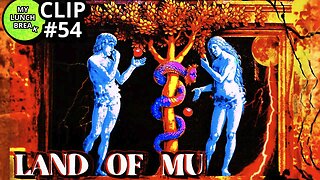Premium Only Content

Martin Barret - Abide With Me (In This World)
"In life, in death, Oh, Lord, abide with me"
Nancy and I thought it time to release this song publicly prior to our CD/Digital Album because the world needs its message now more than ever.
The song features a chorus we wrote for it ( © 2016 ) and which we thought fit in well after two of the verses.
During this present crisis that we, our loved ones and all the world is going through, we are more than happy to provide a downloadable version of the song. Feel free to included it into your playlist and share it with friends. Be blessed by its message and by the One who truly will, when we ask Him, abide in and with us.
https://drive.google.com/file/d/1Da7h...
The author of the hymn, Henry Francis Lyte, was an Anglican minister. He was a curate in County Wexford from 1815 to 1818. According to a plaque erected in his memory in Taghmon Church, he preached frequently in Killurin Church, about nine miles from there. During that time the rector of Killurin Parish, the Reverend Abraham Swanne, was a lasting influence on Lyte's life and ministry. Later he was vicar of All Saints' Church in Brixham, Devon, England.
For most of his life Lyte suffered from poor health, and he would regularly travel abroad for relief, as was customary at that time.
There is some controversy as to the exact dating of the text to Abide with Me. An article in The Spectator, 3 Oct. 1925, says that Lyte composed the hymn in 1820 while visiting a dying friend. It was related that Lyte was staying with the Hore family in County Wexford and had visited an old friend, William Augustus Le Hunte, who was dying. As Lyte sat with the dying man, William kept repeating the phrase "Abide With Me…". After leaving William's bedside Lyte wrote the hymn and gave a copy of it to Le Hunte's family.
The belief is that when Lyte felt his own end approaching twenty-seven years later at the age of 54, as he developed tuberculosis, he recalled the lines he had written so many years before in County Wexford. The Biblical link for the hymn is Luke 24:29 in which the disciples asked Jesus to abide with them "for it is toward evening and the day is spent". Using his friend's more personal phrasing "Abide with Me", Lyte composed the hymn. His daughter, Anna Maria Maxwell Hogg, recounts the story of how "Abide with Me" came out of that context:
The summer was passing away, and the month of September (that month in which he was once more to quit his native land) arrived, and each day seemed to have a special value as being one day nearer his departure. His family were surprised and almost alarmed at his announcing his intention of preaching once more to his people. His weakness and the possible danger attending the effort, were urged to prevent it, but in vain. "It was better", as he used to say often playfully, when in comparative health, "to wear out than to rust out". He felt that he should be enabled to fulfil his wish, and feared not for the result. His expectation was well founded. He did preach, and amid the breathless attention of his hearers, gave them a sermon on the Holy Communion ... In the evening of the same day he placed in the hands of a near and dear relative the little hymn, "Abide with Me," with an air of his own composing, adapted to the words.[1]
Just weeks later, on 20 November 1847 in Nice, then in the Kingdom of Sardinia, Lyte died. The hymn was sung for the very first time at Lyte's funeral. Special thanksgiving services to mark Lyte's bicentenary were held in Taghmon and Killurin churches.
While he wrote a tune for the hymn, the most usual tune for the hymn is Eventide by William Henry Monk.
~ courtesy of Wikipedia
#abidewithme #traditional #newchorus #hymn #worship #music #England #praise #song #Christian #hope
-
 LIVE
LIVE
Steven Crowder
2 hours ago🔴BREAKING: Tulsi Drops Major Receipts Proving Obama Treason over Trump Russia Hoax
69,085 watching -
 LIVE
LIVE
The Rubin Report
38 minutes ago'Shark Tank' Legend Destroys Economy Narrative w/ One Fact
2,661 watching -
 LIVE
LIVE
Law&Crime
2 hours ago $1.18 earnedLIVE: Bryan Kohberger Sentencing — ID v. Bryan Kohberger
1,060 watching -
 LIVE
LIVE
LFA TV
13 hours agoLFA TV ALL DAY STREAM - WEDNESDAY 7/23/25
5,012 watching -
 1:01:05
1:01:05
VINCE
2 hours agoOBAMA: Is It Treason Then? | Episode 91 - 07/23/25
74.5K51 -
 LIVE
LIVE
The Officer Tatum
1 hour agoBREAKING: Tulsi Gabbard RELEASES NEW EVIDENCE On Obama, + MORE | EP 145
745 watching -
 LIVE
LIVE
Caleb Hammer
18 hours agoSeptum Piercing Freak Makes Financial Audit History
88 watching -
 LIVE
LIVE
MYLUNCHBREAK CHANNEL PAGE
22 hours agoLand of Mu and Beyond
284 watching -
 37:00
37:00
Rethinking the Dollar
46 minutes agoWednesday Morning Check-In: Let's Talk...
-
 1:14:10
1:14:10
Dear America
3 hours agoTRUMP Reveals MASSIVE Evidence Against OBAMA!! “ He’s The Ringleader” + Maxwell Subpoena APPROVED!!
74.5K106